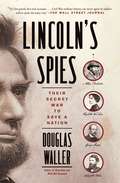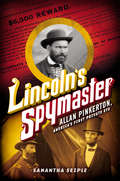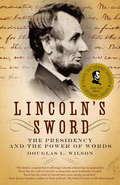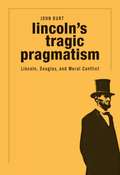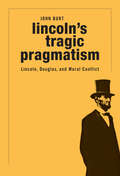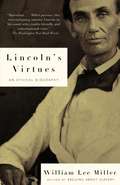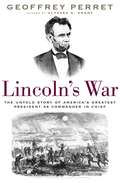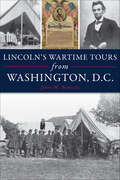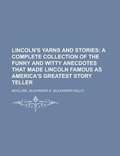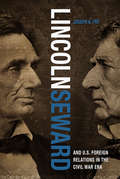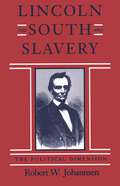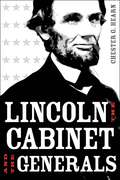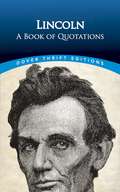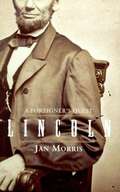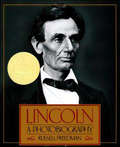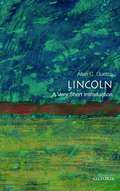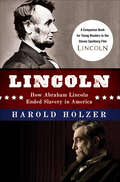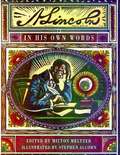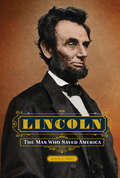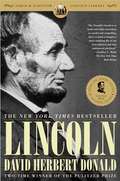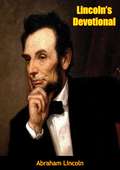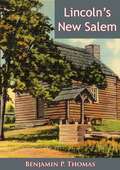- Table View
- List View
Lincoln's Spies: Their Secret War to Save a Nation
by Douglas WallerA major addition to the history of the Civil War, Lincoln’s Spies is a riveting account of the secret battles waged by Union agents to save a nation. Filled with espionage, sabotage, and intrigue, it is also a striking portrait of a shrewd president who valued what his operatives uncovered. Veteran journalist Douglas Waller, who has written ground-breaking intelligence histories, turns his sights on the shadow war of four secret agents for the North—three men and one woman. From the tense days before Abraham Lincoln’s inauguration in 1861 to the surrender at Appomattox four years later, Waller delivers a fast-paced narrative of the heroes—and scoundrels—who informed Lincoln’s generals on the enemy positions for crucial battles and busted up clandestine Rebel networks. Famed detective Allan Pinkerton mounted a successful covert operation to slip Lincoln through Baltimore before his inauguration to foil an assassination attempt. But he failed as General George McClellan’s spymaster, delivering faulty intelligence reports that overestimated Confederate strength. George Sharpe, an erudite New York lawyer, succeeded Pinkerton as spymaster for the Union’s Army of the Potomac. Recruiting skilled operatives, some of whom dressed in Rebel uniforms, Sharpe ran highly successful intelligence operations that outpaced anything the enemy could field. Elizabeth Van Lew, a Virginia heiress who hated slavery and disapproved of secession, was one of Sharpe’s most successful agents. She ran a Union spy ring in Richmond out of her mansion, with dozens of agents feeding her military and political secrets she funneled to General Ulysses S. Grant as his army closed in on the Confederate capital. Van Lew became one of the unsung heroes of the war. Lafayette Baker was a handsome Union officer with a controversial past, whose agents clashed with Pinkerton’s operatives. The unscrupulous Baker assembled a retinue of disreputable spies, thieves, and prostitutes to root out traitors in Washington, D.C. But he failed at his most important mission: uncovering the threat to Lincoln from John Wilkes Booth and his gang. Behind these secret operatives was a president, one of our greatest, who was an avid consumer of intelligence and a ruthless aficionado of clandestine warfare, willing to take chances to win the war. Lincoln’s Spies, as Waller vividly depicts in his excellent new book, set the template for the dark arts the CIA would practice in the future.
Lincoln's Springfield Neighborhood
by Richard E. Hart Bonnie E PaullWhen an emotional Abraham Lincoln took leave of his Springfield neighbors, never to return, his moving tribute to the town and its people reflected their profound influence on the newly elected president. His old neighborhood still stands today as a National Historic Site. The story of the life Lincoln and his family built there returns to us through the careful work of authors Bonnie E. Paull and Richard E. Hart. Journey back in time and meet this diverse but harmonious community as it participated in the business of everyday living while gradually playing a larger role on the national stage.
Lincoln's Spymaster: Allan Pinkerton, America's First Private Eye
by Samantha SeipleFrom Samantha Seiple, the award winning author of Ghosts in the Fog, comes the first book for young adults to tell the story of Allan Pinkerton, America's first private eye.Lincoln's Spymaster tells the dangerous and action-packed adventures of Allan Pinkerton, America's first private eye and Lincoln's most trusted spymaster.Pinkerton was just a poor immigrant barrel-maker in Illinois when he stumbled across his first case just miles from his home. His reputation grew and people began approaching Pinkerton with their cases, leading him to open the first-of-its-kind private detective agency. Pinkerton assembled a team of undercover agents, and together they caught train robbers, counterfeiters, and other outlaws. Soon these outlaws, including Jesse James, became their nemeses. Danger didn't stop the agency! The team even uncovered and stopped an assassination plot against president-elect Abraham Lincoln! Seeing firsthand the value of Pinkerton's service, Lincoln funded Pinkerton's spy network, a precursor to the Secret Service. Allan Pinkerton is known as the father of modern day espionage, and this is the first book for young adults to tell his story!
Lincoln's Sword
by Douglas L. WilsonWidely considered in his own time as a genial but provincial lightweight who was out of place in the presidency, Abraham Lincoln astonished his allies and confounded his adversaries by producing a series of speeches and public letters so provocative that they helped revolutionize public opinion on such critical issues as civil liberties, the use of black soldiers, and the emancipation of slaves. This is a brilliant and unprecedented examination of how Lincoln used the power of words to not only build his political career but to keep the country united during the Civil War.From the Trade Paperback edition.
Lincoln's Tragic Pragmatism
by John BurtIn 1858, challenger Abraham Lincoln debated incumbent Stephen Douglas seven times in the race for a U. S. Senate seat from Illinois. More was at stake than slavery in those debates. In Lincoln’s Tragic Pragmatism, John Burt contends that the very legitimacy of democratic governance was on the line. In a United States stubbornly divided over ethical issues, the overarching question posed by the Lincoln-Douglas debates has not lost its urgency: Can a liberal political system be used to mediate moral disputes? And if it cannot, is violence inevitable? As they campaigned against each other, both Lincoln and Douglas struggled with how to behave when an ethical conflict as profound as the one over slavery strained the commitment upon which democracy depends-namely, to rule by both consent and principle. This commitment is not easily met, because what conscience demands and what it is able to persuade others to consent to are not always the same. While Lincoln ultimately avoided a politics of morality detached from consent, and Douglas avoided a politics of expediency devoid of morality, neither found a way for liberalism to mediate the conflict of slavery. That some disputes seemed to lie beyond the horizon of deal-making and persuasion and could be settled only by violence revealed democracy’s limitations. Burt argues that the unresolvable ironies at the center of liberal politics led Lincoln to discover liberalism’s tragic dimension-and ultimately led to war. Burt’s conclusions demand reevaluations of Lincoln and Douglas, the Civil War, and democracy itself.
Lincoln's Tragic Pragmatism: Lincoln, Douglas, and Moral Conflict
by John BurtA New York Times Book Review Editors’ ChoiceIn 1858, challenger Abraham Lincoln debated incumbent Stephen Douglas seven times in the race for a U.S. Senate seat from Illinois. More was at stake than slavery in those debates. In Lincoln’s Tragic Pragmatism, John Burt contends that the very legitimacy of democratic governance was on the line. In a United States stubbornly divided over ethical issues, the overarching question posed by the Lincoln-Douglas debates has not lost its urgency: Can a liberal political system be used to mediate moral disputes? And if it cannot, is violence inevitable?“John Burt has written a work that every serious student of Lincoln will have to read...Burt refracts Lincoln through the philosophy of Kant, Rawls and contemporary liberal political theory. His is very much a Lincoln for our time.”—Steven B. Smith, New York Times Book Review“I'm making space on my overstuffed shelves for Lincoln’s Tragic Pragmatism. This is a book I expect to be picking up and thumbing through for years to come.”—Jim Cullen, History News Network“Burt treats the [Lincoln-Douglas] debates as being far more significant than an election contest between two candidates. The debates represent profound statements of political philosophy and speak to the continuing challenges the U.S. faces in resolving divisive moral conflicts.”—E. C. Sands, Choice
Lincoln's Virtues: An Ethical Biography
by William Lee MillerWilliam Lee Miller's ethical biography is a fresh, engaging telling of the story of Lincoln's rise to power. Through careful scrutiny of Lincoln's actions, speeches, and writings, and of accounts from those who knew him, Miller gives us insight into the moral development of a great politician -- one who made the choice to go into politics, and ultimately realized that vocation's fullest moral possibilities. As Lincoln's Virtues makes refreshingly clear, Lincoln was not born with his face on Mount Rushmore; he was an actual human being making choices -- moral choices -- in a real world. In an account animated by wit and humor, Miller follows this unschooled frontier politician's rise, showing that the higher he went and the greater his power, the worthier his conduct would become. He would become that rare bird, a great man who was also a good man. Uniquely revealing of its subject's heart and mind, it represents a major contribution to our understanding and of Lincoln, and to the perennial American discussion of the relationship between politics and morality.
Lincoln's War: The Untold Story of America's Greatest President as Commander-In-Chief
by Geoffrey PerretThis is a readable and yet scholarly work which serves as both history and biography. "Incredible as it may seem to us, when Lincoln became president, there was still a question as to whether the president, even acting as commander in chief, had the power to determine military policy. It fell to Lincoln to create the role of commander in chief. This book tells how he did that and how, in so doing, he created the modern presidency."
Lincoln's Wartime Tours from Washington, D.C. (Civil War Series)
by John W. SchildtAbraham Lincoln spent much of his presidency traveling. His visits to Antietam to issue the Emancipation Proclamation and to Pennsylvania for the famed Gettysburg Address are well remembered. During the course of the war, Lincoln also traveled to West Point and Harpers Ferry. As hostilities drew to a close, he spent time on the Virginia battlefields, from Petersburg to Richmond and beyond. In this new edition of Lincoln's Wartime Travels, John W. Schildt details visits to wounded soldiers both Union and Confederate, conferences with generals and the logistics of getting a wartime president from place to place.
Lincoln's Yarns and Stories
by Alexander K. McclureThis is a book that looks at some of the most famous sayings and jokes of President Abraham Lincoln. From the preface: "Sometimes it happens that the biggest crop of laugh is produced by a man who ranks among the greatest and wisest. Such a man was Abraham Lincoln whose wholesome fun mixed with true philosophy made thousands laugh and think at the same time. He was a firm believer in the saying, "Laugh and the world laughs with you." Whenever Abraham Lincoln wanted to make a strong point he usually began by saying, "Now, that reminds me of a story." And when he had told a story every one saw the point and was put into a good humor. The ancients had Aesop and his fables. The moderns had Abraham Lincoln and his stories. Aesop's Fables have been printed in book form in almost every language and millions have read them with pleasure and profit. Lincoln's stories were scattered in the recollections of thousands of people in various parts of the country. The historians who wrote histories of Lincoln's life remembered only a few of them, but the most of Lincoln's stories and the best of them remained unwritten. More than five years ago the author of this book conceived the idea of collecting all the yarns and stories, the droll sayings, and witty and humorous anecdotes of Abraham Lincoln into one large book, and this volume is the result of that idea. Before Lincoln was ever heard of as a lawyer or politician, he was famous as a story teller. As a politician, he always had a story to fit the other side; as a lawyer, he won many cases by telling the jury a story which showed them the justice of his side better than any argument could have done. While nearly all of Lincoln's stories have a humorous side, they also contain a moral, which every good story should have. They contain lessons that could be taught so well in no other way. Every one of them is a sermon. Lincoln, like the Man of Galilee, spoke to the people in parables. Nothing that can be written about Lincoln can show his character in such a true light as the yarns and stories he was so fond of telling, and at which he would laugh as heartily as anyone. For a man whose life was so full of great responsibilities, Lincoln had many hours of laughter when the humorous, fun-loving side of his great nature asserted itself."
Lincoln, Seward, and U.S. Foreign Relations in the Civil War Era (Studies in Conflict, Diplomacy, and Peace)
by Joseph A. Fry&“A heartening reminder that politicians, at their best, can rise above petty rivalries and jealousies to serve a larger cause.&” —Don H. Doyle, author of The Cause of All Nations: An International History of the American Civil War The Civil War marked a significant turning point in American history—not only for the United States itself but for its relations with foreign powers both during and after the conflict. The friendship and foreign policy partnership between President Abraham Lincoln and Secretary of State William Henry Seward shaped those US foreign policies. These unlikely allies, who began as rivals during the 1860 presidential nomination, helped ensure that America remained united and prospered in the aftermath of the nation&’s consuming war. In Lincoln, Seward, and US Foreign Relations in the Civil War Era, Joseph A. Fry examines the foreign policy decisions that resulted from this partnership and the legacy of those decisions. Lincoln and Seward, despite differences in upbringing, personality, and social status, both adamantly believed in the preservation of the union and the need to stymie slavery. They made that conviction the cornerstone of their policies abroad, and through those policies, such as Seward threatening war with any nation that intervened in the Civil War, they prevented European intervention that could have led to Northern defeat. The Union victory allowed America to resume imperial expansion, a dynamic that Seward sustained beyond Lincoln&’s death during his tenure as President Andrew Johnson&’s Secretary of State. Fry&’s analysis of the Civil War from an international perspective and the legacy of US policy decisions provides a more complete view of the war and a deeper understanding of this crucial juncture in American history.
Lincoln, The South, and Slavery: The Political Dimension (Walter Lynwood Fleming Lectures In Southern History Ser.)
by Robert W. JohannsenWhereas previous scholars have largely ignored the political character of Lincoln's antislavery argument, Johannsen (history, U. of Illinois) sees Lincoln as an astute and ambitious politician whose statements were delivered almost exclusively during political campaigns to meet political goals. He traces the political dimension of Lincoln's antislavery stance as it evolved from the Kansas-Nebraska Act in 1854 to his election as president in 1860
Lincoln, the Cabinet, and the Generals: A GI's Story of Bataan and Beyond
by Chester G. HearnWhile numerous accounts exist of President Abraham Lincoln's often-troubled dealings with either his cabinet or his generals, Chester G. Hearn's illuminating history provides the first broad synthesis of Lincoln's complex relationship with both groups. As such, it casts new light on much of the behind-the-scenes interplay, intrigue, and sparring between the president and his advisors and military commanders during the most precarious years of the Civil War. Turning first to Lincoln's cabinet, Hearn explains that Lincoln exercised a unique decision-making process: he reached a firm conclusion on an issue, but then he debated it endlessly with his cabinet or generals as if still undecided. To ensure the liveliest discourse, Lincoln appointed as his advisors men with widely differing political motivations. The Republican Lincoln spent four years attempting to bring together his cabinet of former Whigs and Democrats in the spirit of cooperation, but he never completely achieved his purpose. Hearn explores the president's relationship with this cabinet, the problems he encountered selecting it, and the difficulties he experienced attempting to maintain ideological balance while trying to maneuver around those who disagreed with him.Lincoln never broached a subject that did not create some level of dissent within the cabinet, and differences in political philosophy and personal rivalries led to great debate over the running of the administration, the selection of generals, foreign relations and military mobilization, emancipation, freedom of the press, civil rights, and other issues. Still, Hearn asserts, Lincoln's ability to navigate internal scuffles and external turmoil helped to define his presidency.Hearn next demonstrates convincingly that even with these difficulties, Lincoln manipulated his cabinet far more adroitly than he did his generals. Many of Lincoln's top military commanders had political aspirations or agendas of their own, while others were close friends of his intransigent cabinet members. Having assumed the role as de facto army chief, Lincoln took responsibility for the mishandling of battles fought by his generals, some of whom were incompetent and unmanageable politicians. Hearn examines the often-disastrous generalship and its impact on Lincoln and the cabinet, as well as the public, the press, and Congress. Based on over a decade of research, Lincoln, the Cabinet, and the Generals offers both a fresh perspective on and a new interpretation of Lincoln's presidency -- one that reveals the leadership genius as well as the imperfections of America's sixteenth president.
Lincoln-Douglas Debate: Values in Conflict (2nd edition)
by Jeffrey Wiese Stan LewisThis book examines the history and nature of Lincoln-Douglas debate in society and introduces value debate by comparing and contrasting it with policy debate.
Lincoln: A Book Of Quotations (Dover Thrift Editions)
by Bob Blaisdell"All I have learned, I learned from books," declared Abraham Lincoln -- and this book offers ample learning from the sixteenth president's wise and often witty remarks. Drawn from speeches, letters, and other sources, these thoughts and opinions range from considerations of human nature and spirituality to the burdens and privileges of the presidency along with many other topics of enduring interest.Selections include comments on morality ("It has been my experience that folks who have no vices have very few virtues.") and the pursuit of happiness ("Folks are usually about as happy as they make their minds up to be.") as well as friendship ("I'm a success today because I had a friend who believed in me and I didn't have the heart to let him down."), human frailty ("It's not me who can't keep a secret. It's the people I tell that can't."), and other thought-provoking subjects.
Lincoln: A Foreigner's Quest
by Jan MorrisWith a fresh eye and inimitable style, the peerless travel and history writer Jan Morris journeys through the life of Abraham Lincoln to sketch an insightful new portrait of America's sixteenth president, one of our greatest and most enigmatic figures. Looking past his saintly image and log-cabin legend, Morris travels from Lincoln's birthplace to the White House to the infamous Ford Theater and conjures him in public and in private, as politician and as father, as commander-in-chief and as husband. With her skepticism and humor and marvelous sense of place, Morris seamlessly blends narrative, history, and biography to reveal the man behind the myth.
Lincoln: A Photobiography (Journeys 2014)
by Russell FreedmanThe Newbery Medal–winning book for young readers presents &“a human portrait of a politician honorably confronting the most vexing issues of his era&” (The New York Times Book Review). Abraham Lincoln stood out in a crowd as much for his wit and rollicking humor as for his height. This Newbery Medal-winning biography of our Civil War president is warm, appealing, and illustrated with dozens of carefully chosen photographs and prints. Russell Freedman begins with a lively account of Abraham Lincoln's boyhood, his career as a country lawyer, and his courtship and marriage to Mary Todd. Then the author focuses on Lincoln&’s presidency, skillfully explaining the many complex issues he grappled with as he led a deeply divided nation through the Civil War. The book's final chapter is a moving account of his tragic death at Ford's Theatre on April 14, 1865. The volume concludes with a sampling of Lincoln writings and a detailed list of Lincoln historical sites. "Few, if any, of the many books written for children about Lincoln can compare with Freedman's contribution…This is an outstanding example of what (juvenile) biography can be. Like Lincoln himself, it stands head and shoulders above its competition." —School Library Journal
Lincoln: A Very Short Introduction
by Allen C. GuelzoBeneath the surface of the apparently untutored and deceptively frank Abraham Lincoln ran private tunnels of self-taught study, a restless philosophical curiosity, and a profound grasp of the fundamentals of democracy. Now, in Lincoln: A Very Short Introduction, the award-winning Lincoln authority Allen C. Guelzo offers a penetrating look into the mind of one of our greatest presidents. If Lincoln was famous for reading aloud from joke books, Guelzo shows that he also plunged deeply into the mainstream of nineteenth-century liberal democratic thought. Guelzo takes us on a wide-ranging exploration of seven problems that confronted Lincoln and liberal democracy--equality, opportunity, the rule of law, slavery, freedom, and reconciliation. The book sets these problems and Lincoln's responses against the larger world of American and trans-Atlantic liberal democracy in the 19th century, comparing Lincoln not just to Andrew Jackson or John Calhoun, but to British thinkers such as Richard Cobden, Jeremy Bentham, and John Bright, and to French observers Alexis de Tocqueville and Francois Guizot. The Lincoln we meet here is an Enlightenment figure who struggled to create a common ground between a people focused on individual rights and a society eager to establish a certain moral, philosophical, and intellectual bedrock. Lincoln insisted that liberal democracy had a higher purpose, which was the realization of a morally right political order. But how to interject that sense of moral order into a system that values personal self-satisfaction--"the pursuit of happiness"--remains a fundamental dilemma even today. Abraham Lincoln was a man who, according to his friend and biographer William Henry Herndon, "lived in the mind." Guelzo paints a marvelous portrait of this Lincoln--Lincoln the man of ideas--providing new insights into one of the giants of American history.
Lincoln: How Abraham Lincoln Ended Slavery in America
by Harold HolzerA new book—and companion to the Steven Spielberg film—tracing how Abraham Lincoln came to view slavery . . . and came to end it.Steven Spielberg focused his movie Lincoln on the sixteenth president's tumultuous final months in office, when he pursued a course of action to end the Civil War, reunite the country, and abolish slavery. Invited by the filmmakers to write a special Lincoln book as a companion to the film, Harold Holzer, the distinguished historian and a consultant on the movie, now gives us a fast-paced, exciting new book on Lincoln's life and times, his evolving beliefs about slavery, and how he maneuvered to end it.The story starts on January 31, 1865—less than three months before Lincoln's assassination—as the president anxiously awaits word on whether Congress will finally vote to pass the Thirteenth Amendment to the Constitution. Although the Emancipation Proclamation two years earlier had authorized the army to liberate slaves in Confederate territory, only a Constitutional amendment passed by Congress and ratified by three-fourths of the states would end slavery legally everywhere in the country.Drawing from letters, speeches, memoirs, and documents by Lincoln and others, Holzer goes on to cover Lincoln's boyhood, his moves from Kentucky to Indiana to Illinois, his work as a lawyer and congressman, his unsuccessful candidacies for the U.S. Senate and his victory in two presidential elections, his arduous duties in the Civil War as commander in chief, his actions as president, and his relationships with his family, political rivals, and associates. Holzer provides a fresh view of America in those turbulent times, as well as fascinating insights into the challenges Lincoln faced as he weighed his personal beliefs against his presidential duties in relation to the slavery issue.The passage of the Thirteenth Amendment would become the crowning achievement of Abraham Lincoln's life and the undisputed testament to his political genius. By viewing his life through this prism, Holzer makes an important passage in American history come alive for readers of all ages.The book also includes thirty historical photographs, a chronology, a historical cast of characters, texts of selected Lincoln writings, a bibliography, and notes.
Lincoln: In His Own Words
by Milton MelzerCombines background commentary with quotes from Lincoln's letters, speeches, and public papers to provide a personal view of his life, thoughts, and actions.
Lincoln: The Man Who Saved America (Illustrated Lives)
by David J KentA lively, illustrated biography of America’s 16th president from his humble beginnings to his historic leadership during the Civil War.Abraham Lincoln was, to put it mildly, an unlikely candidate for president. Raised on the frontier and mostly self-taught, the gangly farmer had little in common with the Founding Fathers, with one exception: a deep and abiding belief in America’s still-fragile experiment in democracy. Turning his quick mind and gregarious personality to politics, Lincoln ascended through state and national government, before being elected president in 1860 on the eve of the Civil War. During that bloody and devastating conflict, Lincoln’s tenacity, strategic brilliance, and plain-spoken eloquence not only helped keep the nation together through its darkest hours but also set the course for a reconciliation that he would not live to see. Filled with historical drama and packed with rare illustrations, Lincoln: The Man Who Saved America weaves the fascinating biography of Abraham Lincoln into the story of the most perilous period in American history.
Lincoln: Two Glimpses Of Abraham Lincoln's Family Life
by David Herbert DonaldDavid Herbert Donald's Lincoln is a stunningly original portrait of Lincoln's life and presidency. Donald brilliantly depicts Lincoln's gradual ascent from humble beginnings in rural Kentucky to the ever- expanding political circles in Illinois, and finally to the presidency of a country divided by civil war. Donald goes beyond biography, illuminating the gradual development of Lincoln's character, chronicling his tremendous capacity for evolution and growth, thus illustrating what made it possible for a man so inexperienced and so unprepared for the presidency to become a great moral leader. In the most troubled of times, here was a man who led the country out of slavery and preserved a shattered Union -- in short, one of the greatest presidents this country has ever seen.
Lincolnomics: How President Lincoln Constructed the Great American Economy
by John F. WasikA biography of Abraham Lincoln that examines his untold legacy as the Great Builder of American infrastructure. Abraham Lincoln&’s view of the right to fulfill one&’s economic destiny was at the core of his governing philosophy―but he knew no one could climb that ladder without strong federal support. Some of his most enduring policies came to him before the Civil War, visions of a country linked by railroads running ocean to ocean, canals turning small towns into bustling cities, public works bridging farmers to market. Expertly appraising the foundational ideas and policies on infrastructure that America&’s sixteenth president rooted in society, John F. Wasik tracks Lincoln from his time in the 1830s as a young Illinois state legislator pushing internal improvements; through his work as a lawyer representing the Illinois Central Railroad in the 1840s; to his presidential fight for the Transcontinental Railroad; and his support of land-grant colleges that educated a nation. To Lincoln, infrastructure meant more than the roads, bridges, and canals he shepherded as a lawyer and a public servant. These brick-and-mortar developments were essential to a nation&’s lifting citizens above poverty and its isolating origins. Lincolnomics revives the disremembered history of how Lincoln paved the way for Eisenhower&’s interstate highways and FDR&’s social amenities. With an afterword addressing the failure of American infrastructure during the COVID-19 pandemic, and how Lincoln&’s policies provide a guide to the future, Lincolnomics makes the case for the man nicknamed &“The Rail Splitter&” as the Presidency&’s greatest builder. &“In this unique blend of biography and policy prescription, journalist Wasik . . . casts Abraham Lincoln as America&’s &“foremost moral architect of economic and social opportunity&” and looks to his life and political career for lessons in how the nation might rebuild its infrastructure and redress income inequality. . . . Wasik convincingly argues that [Lincoln&’s] economic policies deserve more credit.&” —Publishers Weekly &“While revealing as history, Wasik&’s account about the first Republican President&’s launches of infrastructure shame the ignorant, obstinate, narcissist Republicans of today who wish instead to build up tyrant Trump&’s political infrastructure. This is a book to be read and used today.&” —Ralph Nader &“Wasik invented a new word for this book because his theme bears new force: Abraham Lincoln sought a better-built nation and a freer legal space to help every individual, regardless of background, to aspire and rise. Most historians know this too vaguely about Lincoln; Wasik finally gives the great democratic idea the prominence it deserves.&” —James M. Cornelius, Ph.D., editor, Journal of the Abraham Lincoln Association
Lincoln’s Devotional: The Believer's Daily Treasure
by Abraham LincolnThe discovery of Abraham Lincoln’s personal, signed copy of a charming “vest-pocket” devotional has excited the public and historians alike—for here is new testimony to the depth of Lincoln’s faith, new light in an area previously clouded by uncertainty.In his moving introduction to this faithful edition of the 100-year-old book of daily Scriptural messages and inspirational verse, Carl Sandburg knits together fact and conjecture about Lincoln’s religious feelings. We are able to picture Abraham Lincoln carrying this little volume with him as he traveled the old Eighth Circuit; we learn of his familiarity with verses he could encounter in its pages.LINCOLN’S DEVOTIONAL contains a facsimile of Lincoln’s signature on the flyleaf, as he wrote it in his own copy.
Lincoln’s New Salem
by Benjamin P. ThomasOriginally published in 1956, in this book Benjamin P. Thomas tells the story of the village where Abraham Lincoln lived from 1831 to 1837. His three-part examination of the village often referred to as Lincoln’s “Alma Mater” features the founding and early history of New Salem, Lincoln’s impact on the village and its effect on him, and the story of the Lincoln legend and the reconstruction of the town.Thomas argues convincingly that New Salem was the town where Lincoln acquired faith in himself, faith in people. At 22 the future president drifted into town seeking to become a blacksmith. Thomas introduces us to the people who created New Salem and who knew, influenced, and befriended Lincoln.Thomas highlights Lincoln’s arrival, his relationships with his neighbors, his important wrestling match with Jack Armstrong, his self-education, his quiet career as an Indian fighter, his experience as a postmaster largely indifferent to postal regulations, his financial woes as a businessman, his loyal friends who often came to his aid, and his election to the legislature.This colorful history closes with a discussion of the Lincoln legend. The truth of the stories is unimportant. What matters is that the growing Lincoln legend prompted the gradual realization that New Salem was not a dismal mire from which President Lincoln had had to extricate himself but was, in fact, an energizing force. This realization led to research and finally to the restoration of New Salem, which began in 1932.“No other portion of Lincoln’s life lends itself so readily to intensive study of his environment as do his six years at New Salem.”—Benjamin P. Thomas, Foreword
